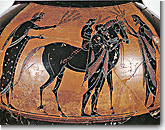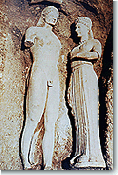



   |
|
|
|
The structure of Archaic society in Hellas was the sine qua non and also the development limit for individual awareness. The general principle of equality of its members became evident with the absence of a priestly caste (as opposed to societies such as those of India or Rome), and consequently with the in theory open access to the
Upbringing played a specially important part in developing individuality. It was not the same in every city. In Sparta, with its common messes and strict military obedience, there was comparatively narrow scope. At Athens, by contrast, care of the body was directly linked with cultivation of the intellect, and combat had as its climax the awarding of a prize to an individual, not to the group to which he belonged. The Pamnhellenic Games at Olympia, Delphi, Nemea and the Isthmus offered the chance of clearly individual distinction. The lists of Olympic winners and the honours we know that the cities reserved for them manifested admiration for the individual who distinguished himself and so released himself from the sameness of the community. |  |
Burial practices indicate that inhumation remained a rite of a clearly private nature. Until the end of the 6th century B.C., we have monumental individual graves, decorated with kouroi and korai, a hymn to the ideal of youth. The name of the dead person is carved on the monument, and a communication is set up between the two worlds, as many epigrams are addressed to the passer-by. Through writing and art, the individual acquires a new access to collective memory. |
 |
 |
In public life, too, individuality acquires an ever-weightier importance. The evolution of law is a typical case. The criminal faces the penalties in person, and - with the exception of atimia - retaliation against his whole family ceases. Further, the individual is linked with a specific estate, and the appearance of the will (even with restrictions) predisposes to yet one more major release of the individual from the city and the oikos.
|
| |
|
Note: Click on a picture for a brief description. | |